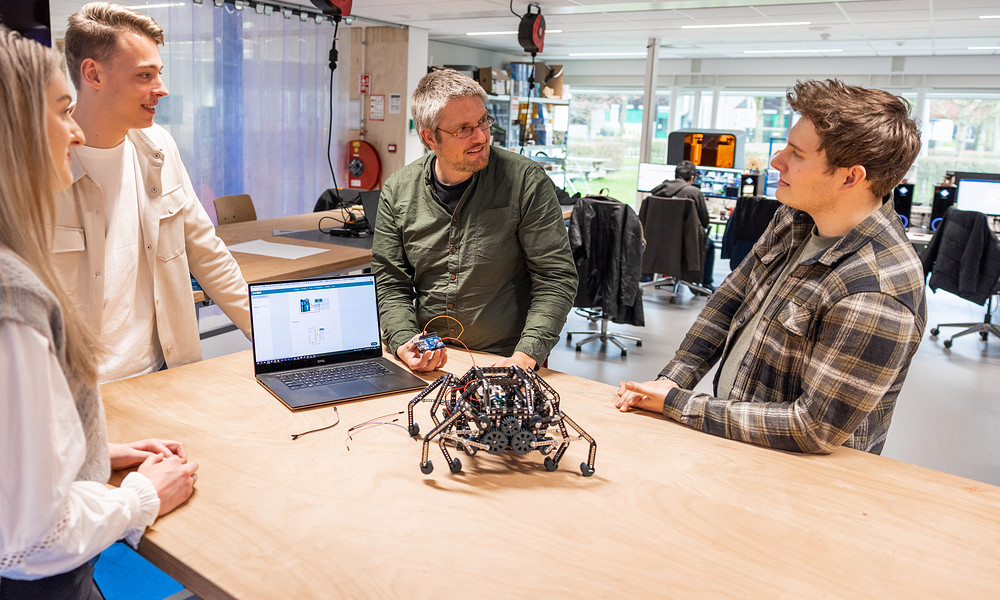The Future of Technology & Society

The Future of Technology & Society
- Level
- Language
- English
- Credits
- 30 ECTS
- Startmonths
- Start: February, September
- Locations
- Groningen
What do you think the world of tomorrow will look like? How do you want the future to look? In what way can you actively contribute to this from your field of expertise? These are the central questions in the minor Future of Technology and Society.
About this minor
In the Minor Future of Technology and society we educate future professionals with the technical and social design skills to create and critically reflect on technology for a better future. Together with other students and stakeholders you explore the future, form your own vision on it and create concepts and technical prototypes.
'What is the future of …*'
*libraries, theatre, education, neighborhoods, the police, events, inclusivity, agriculture, physiotherapy, … [fill in your topic].
That is the central question in the Minor Future of Technology and Society. Together with an intercultural and interdisciplinary team of students and different stakeholders, you will work on projects and assignments related to this question. You will use new technologies to design innovative concepts connected to the societal problems of the future and learn to critically reflect on them.
Some examples of recent projects and topics that students were involved in:
- Developing a VR lab for physiotherapists.
- Using LiDAR technology to scan crime scenes so that the police can use VR and/or AR to revisit them at a later stage and can organise evidence more easily and make it accessible.
- Using technology to make concert and theatre venues more sustainable by for instance using AR and hologram solutions.
- The role of humanoid robots in society.
- Using VR to create a 'real' virtual classroom.
Outcomes
By learning about Futures Literacy, critical citizenship, different technologies, playful exploration, Design Thinking, co-creation, speculative design, interpersonal skills, professional communication and rapid prototyping you get the skills, knowledge and attitudes to become a socially aware designer of future technologies.
Courses
Future
Credits: 10
In this course you will work with different technologies and explore how technological developments and society influence each other. By technical experimentation, Futures Literacy, Critical Citizenship and speculative design you will understand, interpret, reflect and work with the latest developments in technology and society. During this course you will look through different lenses and mindsets to the future of different topics. The goal is to form your own vision on the future, design a speculative artefact in it and learn new technical skills to start creating this future.
Project Technology and Society
Credits: 20
In this project the future is connected to a real topic and environment. You will work in a project group, together with stakeholders on a concrete problem, topic, or issue in the field of society, technology, and the future. During the project you will explore the future of your topic and by researching, playfully exploring and imagining it, you will create your own vison. Within this vision you create a future concept using different design methods and build a technical prototype as a first step towards your future concept.
During the project you will learn about design and prototyping methods, co-creation , stakeholder communication, work in an intercultural and interdisciplinary team, project management, designing user experiences and how to communicate and share the results of your project in an engaging way.
Before you can start
This minor is open to all students from Hanze UAS, other universities in the Netherlands (KOM) and exchange students. You have to be in the main phase of your study. A propaeduetic certificate is not required.
For questions about the content of this minor, please contact the coordinator via the ‘Contact & FAQ’ tab above.
Admission & application
Please check with your home university whether there is an agreement set up with the Hanze School that is offering the exchange programme of your choice. To apply for and be admitted for our exchange programme you should take the following steps
-
1. Be nominated by your home university
Once you have been nominated, your nomination will be checked by us and confirmed to your home university by email. You will receive your application link during our application period.
-
2. Submit your online application
Once you have been nominated by your home university you will receive a personal application link and the application instructions during our application period. The application is fully digital and documents do not have to be send by email or postal mail. Make sure you do not miss our application deadline!
-
3. Letter of Acceptance
Once you have submitted your application we will check your documents. If you have to re-submit any documents, we will let you know. We will be sending out Acceptance Letters from the beginning of May when you start in September and from the middle of October when you start in February.
Find out more about our application process and practical matters.
Frequently Asked Questions
Contact
-

Floris Maathuis
Lecturer



